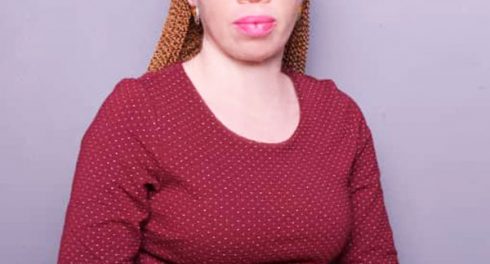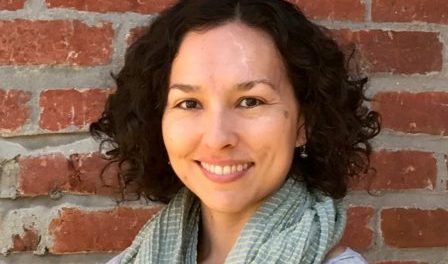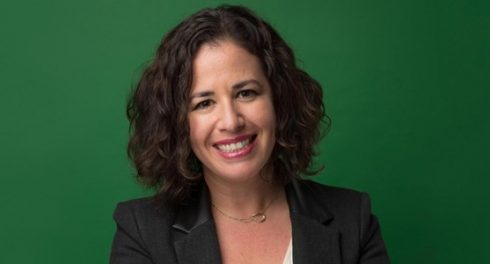From student activism to human rights lawyer and now a global program officer on Civic Engagement and Government at the Ford Foundation, Otto Saki has provided technical assistance to civil society, government ministries, and government agencies across sub-Saharan Africa on legislative reforms and other law-related matters.
At Ford Foundation, Otto’s work covers a strategic driven portfolio of grantees working with regional mechanisms, business, human rights, women’s rights, gender and sexual violence, Africa-China relations, and internet freedom. You can also catch up with him at the Centre for Applied Legal Research (CALR), where he provides technical assistance to ensure that the law is utilized to respond to Zimbabwe’s everyday societal challenges.
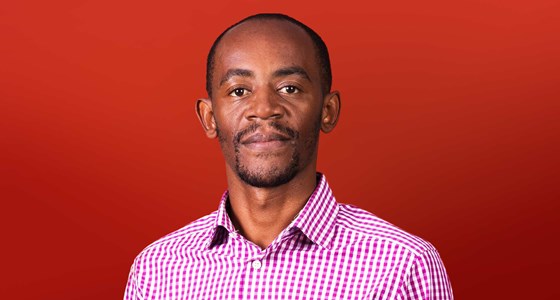
Otto Saki. Photo Credit: Ford Foundation
Good to have you here, Otto! Can you remember what first motivated you to work on transparency and accountability issues?
My earliest involvement in this work, on human rights and governance issues, was in 2001, after I had been suspended indefinitely from the University of Zimbabwe as a second-year law student for student activism.
One of my lecturers linked me to a trade union of farmer workers – the General Agricultural and Plantation Workers Union – as they were looking for a law intern to help with documenting the labor issues and disputes on plantations and farms. With this lecturer’s support (who was a constitutional, labor law lecturer, and activist in his own right), I spent months documenting the stories of former farmer workers. They had been forgotten and violated during the land reform program. Their stories and many others convinced me to focus on human rights, especially of the forgotten.
Even today, despite the land reform in Zimbabwe being perceived as a success, the very individuals who were the backbone of white commercial farms are not beneficiaries of the land reform. For generations, their lives revolved around these farms. The new landed elite ignored and or at worst, continued with the slave wages and conditions that most faced under white commercials.
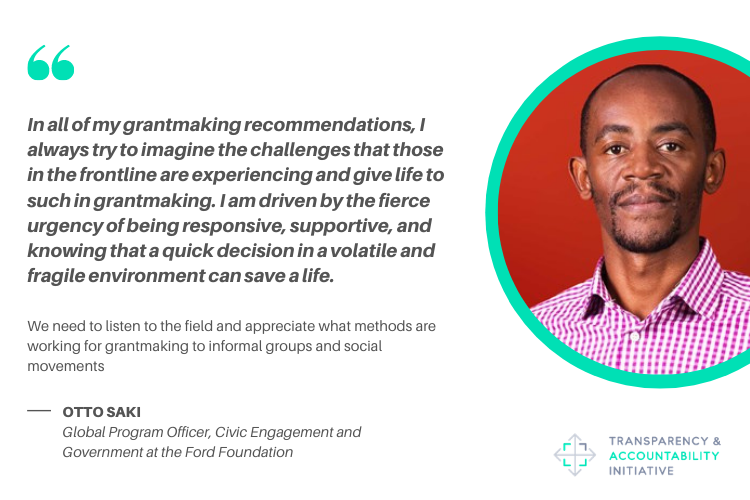 In the number of years, you have worked on projects relating to media freedom, civic freedom, and internet governance; what significant change(s) have you seen? And what other changes would you like to see/expect to see in the next few years?
In the number of years, you have worked on projects relating to media freedom, civic freedom, and internet governance; what significant change(s) have you seen? And what other changes would you like to see/expect to see in the next few years?
Over the years, considerable positive and negative changes have been recorded. The opening of spaces for citizens in many countries has meant that regimes and governments do not take citizens for granted. The excitement with the so-called democratization wave witnessed the collapse of authoritarian regimes across many regimes. With this democratization came the opening of space for media, media freedoms, and adoption of several instruments at declarations at national, regional, and global levels.
Associated with the democratization was the opening of civic freedoms and the proliferation of groups and voluntary, informal, and technical professionalized entities. The rapid advancement of the internet has created another frontier for governance. Several organizations, including private and public, have emerged to grapple with the regulation or governance of this public good.
The major changes that I hope we can focus on are the disruption of the entrenched notions on democracy or civic freedoms that have excluded voices and driven an elite wedge in societies. This means deliberate inclusion and focus on groups that have been ignored in these conversations, and with the resources, especially financing.
Informal groups and associations who are at the forefront of providing emergency support to communities when governments fail to respond to humanitarian or climate disasters or pandemics are viewed as difficult to work with or that they don’t have systems for receiving funds.
Funding has been in siloes and has driven divisions between different groups. So we speak of humanitarian, water, sanitation, and health as separate groups, and those working on governance rights and human rights as separate, yet the very same communities or constituencies we purport to be interested in are not living separate identities. They have multiple identities and might not see these divisions the same way.
Global institutions, multilateralism have been paraded as a panacea to some of the structural issues we are facing. Yet, those same institutions are closed to citizens, are expensive to engage with, are elite-driven, and if not neo-colonial in nature, as they reflect the state of order in the constituent countries. These spaces are crying for reform, but who will hang the bell on the cat?
You mentioned some challenges regarding the funding of informal group and associations, what kind of funding/grantmaking reforms would like to see changed, especially from the part of funder organization?
Two things. First, we need to listen to the field and appreciate what methods are working for grantmaking to informal groups and social movements. This should not disturb local ecosystems. A few intermediary groups are exploring new ideas and new ways of supporting these entities. Second, several of the funding models we have continue to deepen inequalities. Power and race are major issues. The neo-colonial funding models have advanced dependency on external funding without investing in long term financial solutions. This perpetuates a donor-grantee relationship with the donor holding an oxygen tank, which can easily be turned off. Several groups suffer from slow financial asphyxiation at the hands of funders, philanthropy, and bilateral alike.
On the flip side, what advice would you give these potential grantees to better position themselves – so that both the grantee and funder organization can meet each other halfway?
The grantees should continue to be driven by their values and ideologies, including the ability to negotiate grant terms that are humane, not tantamount to contemporary slavery. Activists, individuals in civil society, both formal and informal groups, work in extremely precarious conditions. A funder “expects” project deliverables but is not willing to pay medical insurance. These are groups supporting social justice work. It’s ironic. There are different ways and means of supporting informal groups. The question remains whether philanthropy and funders are willing to be disruptive or imaginative, cede power, place agency back in communities, and restore the legitimacy of citizen and community voices.
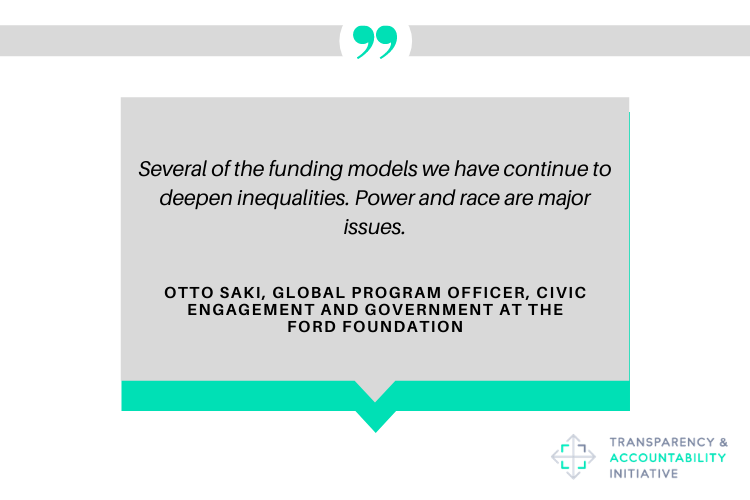 How has your experience over the years shaped the work you do now program officer?
How has your experience over the years shaped the work you do now program officer?
There is a constant tension between my work experiences and being a program officer in a foundation. I must always remind myself that I am not on the frontlines of social justice work, but as a program officer might only be an enabler for those doing the work. This is the impatient part of me when I listen to the bureaucratic processes or the whitewashing of issues. In all of my grantmaking recommendations, I always try to imagine the challenges that those in the frontline are experiencing and give life to such in grantmaking. I am driven by the fierce urgency of being responsive, supportive, and knowing that a quick decision in a volatile and fragile environment can save a life.
What recommendations will you give your younger self or anyone starting out as a program officer in this space?
To anyone thinking of starting out as a program officer in philanthropy or working on issues of transparency and accountability, remember that it’s a privileged position, and therefore birthed from inequalities.
Always hold your assumptions about anyone lightly and always leave room to be surprised and not think you have solutions for everything under the sun.
If you want to be noticed in this work, then it’s not the space to be. If you want to make a difference, then remember you are not the first and will certainly not be the last. Make your contributions with humility. You are not the general manager of the universe.
What’s the most useless talent/skill you thought you have but has otherwise proved valuable?
Due to my upbringing and managing family and personal dynamics, I developed this ability to place issues into “mental compartments”. I found that it helps in processing complexities and navigating new terrain, and managing relations, especially in environs where A doesn’t engage with B and C because they were or are hostile. I will speak to B and C and manage relations separately from A while pursuing shared objectives. I will show solidarity but will not show false solidarity!
